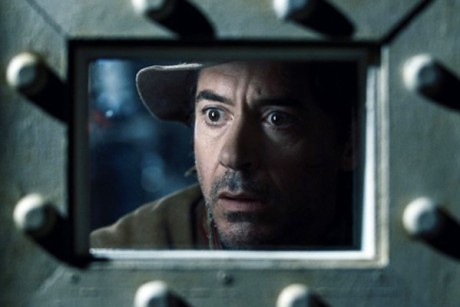 One of the year's best films features perhaps Clooney's finest performance. This review previously appeared in ICON and is reprinted with permission. (Thanks, Trina.)
One of the year's best films features perhaps Clooney's finest performance. This review previously appeared in ICON and is reprinted with permission. (Thanks, Trina.) Alexander Payne prefers a lasting impression to an immediate impact. At the surface, The Descendants, his first movie in seven years, is about a harried father coping with two rambunctious daughters and a comatose wife. That's like calling Payne's glorious Sideways a buddy-buddy comedy about wine. What lies beneath is glorious.
Attorney Matt King (George Clooney) calls Hawaii home, but notes that living in paradise does not make him immune to life. His adventurous wife, Elizabeth (Patricia Hastie), lies in a coma after a boating accident, a tragic development in an unraveling marriage. When she wakes up, Matt vows to talk things out with her. In the meantime, Matt is thrown into the unsavory role of primary caregiver. "I'm the back-up parent; the understudy," he tells us. It shows. His younger daughter, Scottie (Amara Miller) is a belligerent handful, and Matt's attempts to control her are half-hearted.
There's also work-related chaos. He's orchestrating a lucrative deal: selling 25,000 acres of pristine island property in the family's trust, which will make Matt and his cousins very rich. Then, everything changes. The doctor tells Matt that Elizabeth has no chance at living a normal life, a condition that legally requires taking her off life support. Ever the paragon of parental resolve, Matt picks up his older, brattier daughter, Alexandra (Shailene Woodley), from boarding school to help him inform friends and family.
Alex, sullen and resentful at the sudden attention from her neglectful father, has no desire to do anything for her mother. Matt tells Alex to grow up. That's when Alex drops the bombshell: Elizabeth was seeing another man. At this point, Payne's restraint becomes a glorious asset. Matt is determined to discover who slept with Elizabeth, a situation that any other director would portray as a race against time or some other domestic vengeance nonsense. It's clear that Matt needs closure right now. By not wasting time on the obvious, Payne provides the little details that make The Descendants such a lush film.
Payne, along with co-screenwriters Jim Rash and Nat Faxon, dares us to pay attention. Matt remarks that all the women in his life are determined to make him miserable, but what has he done to prevent that? Teachers and parents recognize Scottie's lack of respect, but not Matt, who lets her toss deck chairs into the pool. Alex's self-loathing—no one gave her credit for getting good grades or even saw her in the school play—highlights how oblivious both parents are. Also, Elizabeth and Matt clearly weren't a match. Early on, Matt comments that he hasn't ridden a surfboard in 15 years. What's prominently displayed in their backyard? Surfboards. Matt's father-in-law (Robert Forster) chastises Matt for being cheap with Elizabeth. What's most telling in those scenes is that Matt never corrects him.
Matt facilitates the pre-ordained. The King family has always been taken care of, so of course the land should be sold. Before taking the girls and Alex's dopey friend (Nick Krause) on a luxurious search for Elizabeth's paramour, Nick was content as the understudy, even though Elizabeth clearly wasn't mother-of-the-year material. When Alex observes that she's becoming her mother, it's uttered with the solemnity of a cancer diagnosis. Matt's quest isn't about resolution. It's about saving himself and his family.
Clooney's excellent performance is worthy of Matt's emotional journey. For years, the star has eschewed empty blockbusters for movies (e.g., Up in the Air, The Ides of March) that were so busy peddling important messages that they obscured his best qualities. Without a world-saving agenda to support in The Descendants, we remember that Clooney is the new Jack Nicholson, a leading man who can adjust his charisma for the situation. (Nicholson did just that, playing a pathetic, adrift retiree in Payne's About Schmidt.) Matt is flawed in many respects, but we always like him. That has everything to do with Clooney, whose performance adjusts to Payne's subtle shifts. In a supporting cast of able veterans (Judy Greer, Beau Bridges, a surprisingly good Matthew Lillard), the 20-year-old Woodley shines. As a crazy scheme develops faces and complications, she, like the movie, matures in front of our eyes.
Little things add up, both in life and in The Descendants, which by the end has accumulated the emotional resonance and complexity of a great novel. Payne has made a grand, emotional masterpiece from tiny strokes. So many dramas scream and strain to be heard. Rare is the movie that can satiate the soul by ending with couch-bound characters eating ice cream in front of the television. By mastering the art of what not to say, Payne has become one of America's most essential filmmakers. [R]
 This is an annual form of distress for me. Inevitably, I'll forget something or feel bad that I haven't seen two or three key films that were adored by the masses. But that's the way it goes. I'm never going to see everything. All I can do is write about how the films affected me, and share that love, hate, or indifference in the most expressive way possible.
This is an annual form of distress for me. Inevitably, I'll forget something or feel bad that I haven't seen two or three key films that were adored by the masses. But that's the way it goes. I'm never going to see everything. All I can do is write about how the films affected me, and share that love, hate, or indifference in the most expressive way possible. 






